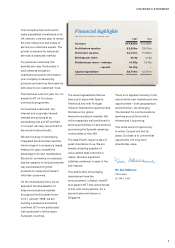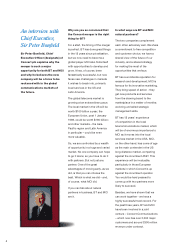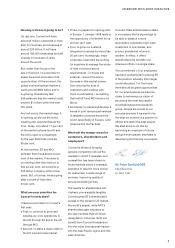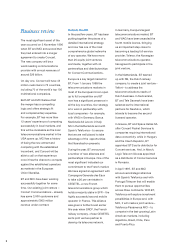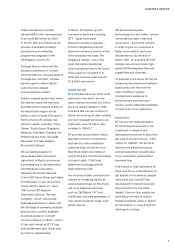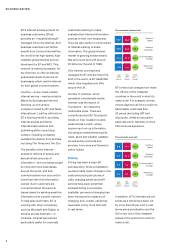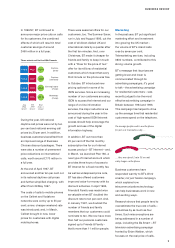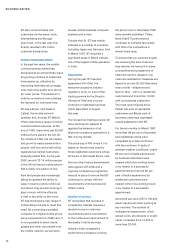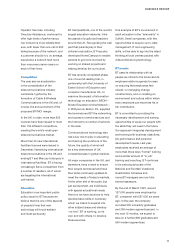BT 1997 Annual Report Download - page 13
Download and view the complete annual report
Please find page 13 of the 1997 BT annual report below. You can navigate through the pages in the report by either clicking on the pages listed below, or by using the keyword search tool below to find specific information within the annual report.
13
Financial review
Introduction
BT’s earnings of 32.8 pence per share for the year ended
31 March 1997 were 3.7% above the previous year’s. The
results have benefited from the strong growth in demand
for the group’s products and services, particularly the
newer advanced services such as FeatureNet, together
with reduced redundancy charges. These factors were
partially offset by substantial price reductions in the year
benefiting customers by over £800 million. The group’s
results are summarised in the following table:
1997 1996
Increase
(decrease)
£m £m %
Turnover 14,935 14,446 3.4
Operating costs before
redundancy costs (11,323) (10,925) 3.6
Redundancy costs (367) (421) (12.8)
Operating profit 3,245 3,100 4.7
Group’s share of
profits of associated
undertakings 139 82
Profit on sale of group
undertakings 87
Net interest and
premium payable (189) (170)
Profit before taxation 3,203 3,019 6.1
Taxation (1,102) (1,027)
Profit after taxation 2,101 1,992 5.5
Minority interests (24) (6)
Profit for the
financial year 2,077 1,986 4.6
Earnings per share 32.8p 31.6p 3.7
Regulation and prices
The year to 31 March 1997 was the last full financial year
in which the majority of BT’s main UK services were
subject to price regulation. Under current price controls
which are in force up to 31 July 1997, BT has had to
reduce its overall prices for its main UK services,
principally inland and outgoing international call services
and exchange line rentals, under the RPI minus
7.5 formula. In the current price control year to
31 July 1997, BT has reduced its prices by about 5% after
reducing them by nearly 2% in the previous year. This
price control is estimated to have affected slightly over
50% of the group’s total turnover for the year ended
31 March 1997.
From 1 August 1997, a new retail price control will apply
under which a cap of RPI minus 4.5 will apply to the
services used by the lowest 80% of BT’s residential
customers by bill size. This new retail price control is
estimated to cover services representing about 18% of the
group’s total turnover for the year to 31 March 1997.
Interconnect charges are a key element in the
development of network competition. Oftel is planning to
introduce changes to the current controls on network
charges later this year. The proposed arrangements are
likely to shift the basis for setting charges from fully
allocated historic costs to long-run incremental costs and
to replace annual determinations of each interconnect
charge with a system based on RPI minus price caps.
Competition and the UK economy
BT has a significant share in its main UK markets for
telephone calls and provision of exchange lines. But
competition is eroding BT’s share in key market sectors in
particular areas of the UK and for certain products and
services. Figures published by Oftel indicated that BT had
79% of the market for national calls for the quarter ended
30 September 1996, compared with 80% a year earlier,
and supplied 91% of the exchange lines in the UK at
30 September 1996, compared with 94% a year earlier. In
the mobile telecommunications market, Cellnet continues
to face strong competition from its direct competitor and
the two personal communications operators in the UK.
BT expects the competitive pressure to persist and
it will continue to defend its market share vigorously
and fairly.
The strength of the UK economy is an important
determinant of BT’s business volumes and the gross
domestic product grew by 3.0% in the year ended
31 March 1997, compared with 2.0% in the previous year.
Turnover
Total turnover grew by 3.4% to £14,935 million in the year.
The strong growth in demand for the group’s products
and services of approximately 8% was partially offset
by the effect of price reductions which averaged over
5% across the business.


